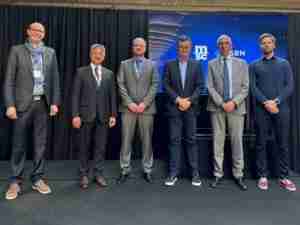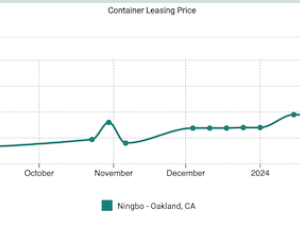Thank you Jim, both for the invitation to talk to you all today and for the kind introduction.
As I have already mentioned to several of you, it is a truly great pleasure for me to be here and to catch up on the news from the Great Lakes community.
As Jim mentioned briefly in his introduction, I did my time on the Lakes - and it was one of the most enjoyable assignments I ever had with ABS.
It was from 1973-77.
I was stationed initially in Chicago, Milwaukee and finally Sturgeon Bay which meant I spent a lot of time at Bay Shipbuilding ' as it was then called and will probably always be known to most of us.
Enjoyable - because of the special kinship of the Lakes fraternity ' the builders, the owners, and the crews that I worked with.
Memorable - because of the unique nature of the ships and the trades.
And professionally challenging, for an old Texaco tanker man, to have been involved in the new construction of self-unloaders, including being there at the start of the thousand footer project.
Since that time my assignments have taken me all around the world and I regret I have not had the opportunity to come back up north to spend more time in the area with you.
That doesn't mean I haven't kept a weather eye on your activities - and having several of you as ABS members has also meant I have been able to follow your fortunes - or sometimes the lack of them.
Understandably, all of the newbuildings I attended at Bay Shipbuilding more than 30 years ago are still sailing.
But I have noticed the slow decline in the overall numbers of both the US and Canadian-flag fleets over the years ' a trend that has mirrored the decline in the traditional heavy industries along the lake shores
It is sad to drive through Lackawanna on the Buffalo foreshore these days and see the miles of largely abandoned mills that, in the early seventies, were pouring steel.
I have never been able to understand why American shipbuilders, who invented the series production of ships with the Liberty ships and T-2 tankers, conceded their technical superiority and now take twice the time, and charge twice as much, to build the same ship as their Asian counterparts.
And I never thought that, in my lifetime, General Motors would declare bankruptcy.
But those are the unfortunate facts of our modern North American economy.
And so I think back to the names I used to encounter all the time ' Bethlehem, Republic, Kinsman, Cleveland Cliffs, Oglebay Norton, Hanna, Hall, Patterson, Misener ' all gone from the shipping business.
Some, casualties of the mismanagement of their parent companies.
Some, as a result of wider strategic decisions by their parents and others casualties of the decline of US and Canadian manufacturing or an inability to keep pace with changing times.
Even Bay Shipbuilding itself is now Fincantieri Marine Group ' it seems the Italians are now better than us at both building ships and building cars.
Sad, sad times and a terrible commentary on the decline of American industry.
Why is it that, in some areas such as in the high tech sector, we continue to lead the world with unmatched ingenuity and vision while in the more traditional heavy industries we continue to lose our way?
Is it a paralysis of intent, of action, of ability?
I don't think any of those apply to the owners and operators of the Lakes fleet.
There is no more efficient bulk carrier in the world than a Great Lakes self-unloader.
You have always been ' and continue to be - extremely resourceful ship managers.
Your captains are some of the best ship handlers you will find anywhere.
The efficiency of the entire Great Lakes transportation system is absolutely remarkable.
But then I look at the environment in whi





